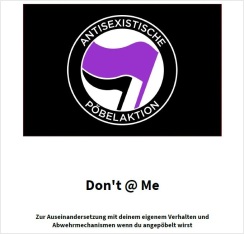Diskussionsrunde am 19.01.2018 ab 19 Uhr
Mit dem Hashtag #metoo und der folgenden Diskussion geht das Thema sexualisierte Übergriffe – mal wieder – durch alle Medien. Und wieder folgen die Reaktionen den bekannten Mustern. Den Beschuldigten wird eher geglaubt als den Anschuldigenden. Die Motive der Anschuldigenden werden in Frage gestellt, böse Absichten werden unterstellt. Hingegen geben sich die Beschuldigten als „Opfer“ einer Kampagne, fühlen sich zu unrecht beschuldigt oder falsch verstanden. Selbst wenn Fehlverhalten zugegeben wird, werden unzählige Gründe zur Erklärung für die Handlungen genannt und damit das Passierte entschuldigt und relativiert. Manche Personen scheinen dabei wahrlich „unangreifbar“ zu sein – „Das kann der Mensch doch nicht getan haben! Der macht so viele gute Dinge!“
Während die Medien zumeist die Fälle bekannterer Personen betrachten, haben viele von uns genau dies schon im privaten Bereich erlebt, oder gar in der „linken“ aktivistischen Gruppe, wo so etwas doch eigentlich nicht vorkommen sollte.
Wir möchten uns mit euch zu diesem Thema in achtsamer Atmosphäre austauschen und Möglichkeiten des Umgangs in aktivistischen Kreisen diskutieren.
Wenn ihr Lust und Zeit habt, könnt ihr euch anhand folgender Texte vorbereiten:
Kai Cheng Thom – 9 Ways to Be Accountable When You’ve Been Abusive (EverydayFeminism.com)
Maisha Z. Johnson – 6 Awful Things That Happen When We Think ‘Good’ People Can’t Be Rapists or Abusers (EverydayFeminism.com)
Jamie Utt – Intent vs. Impact: Why Your Intentions Don’t Really Matter (EverydayFeminism.com)
Die Antisexistische Pöbelaktion hat auf Grundlage dieser Texte die folgende Broschüre auf Deutsch herausgegeben:

Auch die folgende Broschüre der HU Berlin könnte interessant sein – vor allem der Artikel „Solidarische Kritik“ von Conni* Krämer ab S. 27:
Diskriminierungskritische Lehre: Denkanstöße aus den Gender Studies
English
How to deal with intrusive behaviour (even your own)
Discussion on January 19th, 2018 starting at 7 pm
With the hashtag #metoo and the following discussion, the topic sexualized offensive behaviour is – again – in the media. And again the reactions follow the well-known patterns. People tend to believe the accused, not the accusing. The inducements of the accusing persons are questioned, bad intentions are assumed. The accused however present themselves as the „victims“ of a campagne, feel like they would be wrongly accused or misunderstood. Even if wrongdoing is admitted, uncountable reasons for the acts are stated, so that everything that happened shall be excused and relativated. Some persons really seem to be „untouchable“ – „No way this one could have done that! He does so many good things!“
While the media mostly cover the cases of celebreties, a lot of ourselves have experienced exactly the same thing in their private lives, or even in a „leftist“ activist group where something like this actually shouldn’t be possible to happen.
We would like to exchange experiences concerning this topic with you in an attentive atmosphere and discuss some possibilities for handling it in activist circles.
If you have desire and time to prepare, you could read the following texts in advance:
Kai Cheng Thom – 9 Ways to Be Accountable When You’ve Been Abusive (EverydayFeminism.com)
Maisha Z. Johnson – 6 Awful Things That Happen When We Think ‘Good’ People Can’t Be Rapists or Abusers (EverydayFeminism.com)
Jamie Utt – Intent vs. Impact: Why Your Intentions Don’t Really Matter (EverydayFeminism.com)
(For German brochures, click the links above.)
